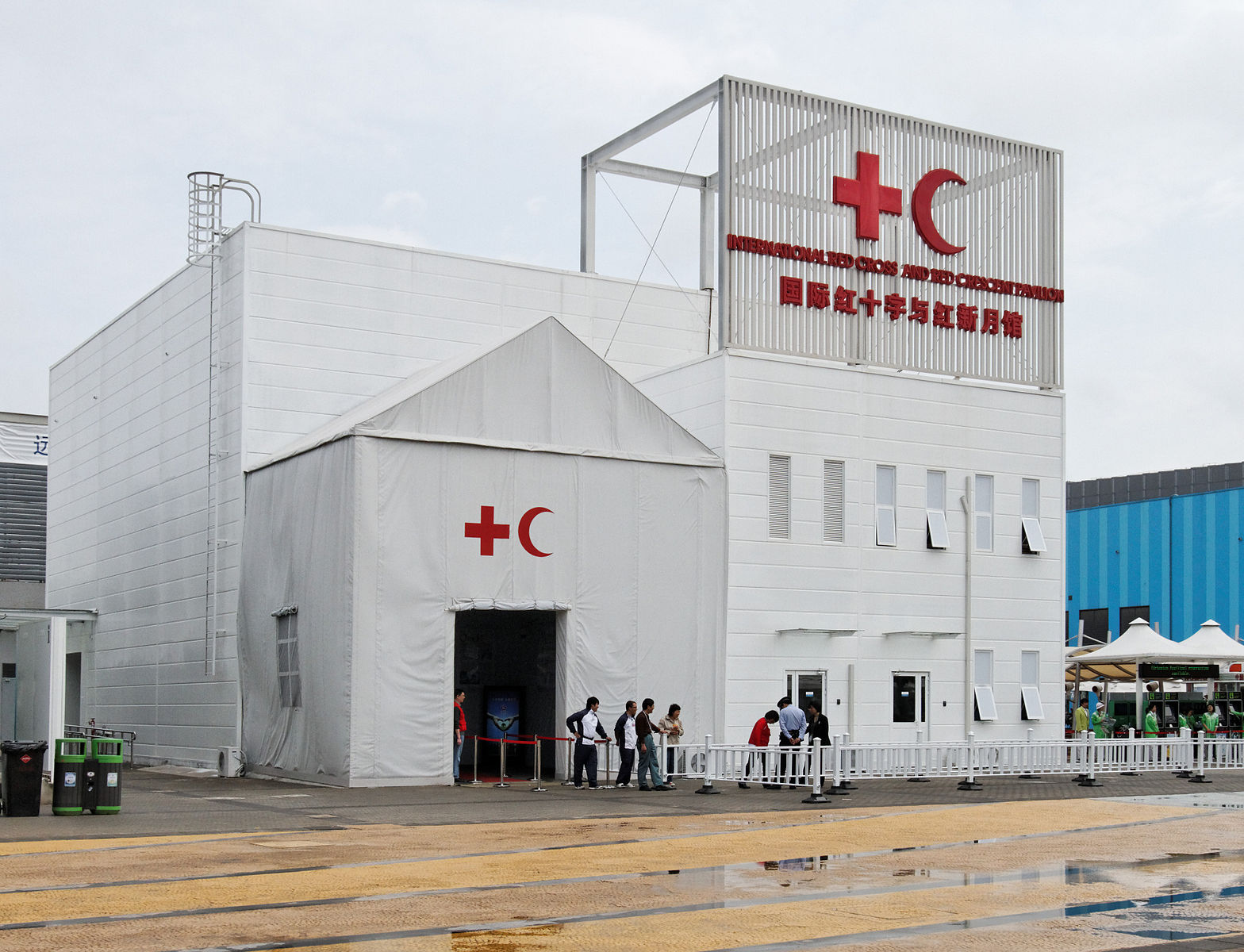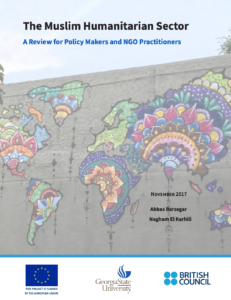
How the worlds of faith and development intersect is of key importance when one considers the enormous weight religious identities hold throughout global society. In particular, the nature and role of faith-based organizations (FBOs) is increasingly becoming a subject of scholarly inquiry as cultures of the world become more integrated and as inherently transnational issues such as countering violent extremism (CVE) come to a forefront in policy discussions. The value of understanding these organizations and their functions is perhaps especially significant given that societies marred by conflict appear to especially prioritize religious identity.
“Unfortunately, the biggest misunderstanding about the Muslim humanitarian sector is the fact that these faith-based aid and development organizations are, in one way or another, linked to terrorist groups and finance. Through a European Commission funded project, I, together with Abbas Barzegar, have had the opportunity to closely work with some of the top actors in that sector in order to have a better understanding of their efforts on the ground.”
Against this background, analysis of Muslim FBOs often face another layer of complication. Unfortunately, the biggest misunderstanding about the Muslim humanitarian sector is the fact that these faith-based aid and development organizations are, in one way or another, linked to terrorist groups and finance. Through a European Commission funded project, I, together with Abbas Barzegar, have had the opportunity to closely work with some of the top actors in that sector in order to have a better understanding of their efforts on the ground. This resulted in a report titled, “The Muslim Humanitarian Sector: A Review for Policy Makers and NGO Practitioners.” In the report, we’ve highlighted some of the major issues emerging from years of dialogue-based focused groups and stakeholder research aimed at better understanding the barriers to, and opportunities for, greater cooperation with the global Muslim aid and development sector.
Under the auspices of the EU Commission’s Bridging Transatlantic Voices Initiative, our team at Georgia State University along with researchers at the British Council facilitated closed-door dialogue-based focused groups with practitioners, policy-makers, and scholars to gain insight into the history and trajectory of engagement between Muslim FBOs and their counterparts in the mainstream international aid and development sector. Overall, we’ve learned that Muslim humanitarian organizations mainly face issues around legitimacy and credibility. These organizations are on a constant process of negotiation of their role as faith-based actors in a secular aid and development field, the management of the issue of terrorist accusations, all the while attempting to better serve their beneficiaries and professionalize the sector as a whole.
Contextualizing the Muslim humanitarian sector in secular development and aid
In order to better understand the current position of Muslim humanitarian sector, it is important to start with the modern history of aid and development. Initially, the idea of charity and extending help across the world was introduced by religious organizations who were some of the founding actors of the broader aid and development sector. Yet, the historical background of structured systems of humanitarian engagement rests on modern secular concepts such as neutrality and partiality which were seen as the building blocks of the (1864) Geneva Convention and the ICRC In essence, the establishment of contemporary humanitarian law through the Universal Declaration of Human Rights (1948) explicitly adopted a secular understanding of development and aid, which approached religion as synonymous with divisiveness and intolerance, making it inappropriate as a structure for humanitarian engagement.
Fortunately, a shift away from this view has been occurring in the past decade or so. A willingness to include religious actors and acceptance of faith-based organization to a certain degree can be seen in events such as the Dialogue on Faith and Protection hosted by the United Nations High Commissioner for Refugees in December 2012, or the launch of UK Department for International Development’s five year research program on religion and development in 2005, and further articulated it in its Faith Partnership Principles in 2011. It is, therefore, safe to say that we are in the midst of a significant move, which focuses on the overall recognition of the centrality of religion and the re-thinking of secularism in humanitarianism.
“Currently, development practitioners are demonstrating that religious leaders and institutions can play a key role in furthering progress in the realms of family planning, public health, and gender issues. Political, economic, and security-oriented policy makers are also coming to realize the critical role of religion in geopolitics, largely due to the rise in religious and political conflict in recent decades.”
Currently, development practitioners are demonstrating that religious leaders and institutions can play a key role in furthering progress in the realms of family planning, public health, and gender issues. Political, economic, and security-oriented policy makers are also coming to realize the critical role of religion in geopolitics, largely due to the rise in religious and political conflict in recent decades. Evidence from case studies and practices that demonstrate the positive relationship between politics and religion is long overdue to change embedded perceptions in government that religion is only a regressive force. For example, the establishment of Partnership on Religion and Development in 2016 aimed to coordinate efforts across traditional barriers between faith-based institutions and government. With this in mind, the first section of our report provides a review of the distinctive characteristics of the Muslim humanitarian sector such as the role of theology in the sector, typologies of organizations, and its recent history vis-à-vis global Islamic revival.
Muslim NGOs and terrorism: false equivalencies
FBOs contribute uniquely to the development and mobilization of civil society with regard to how they interact with states. For example, since the late 1990s, FBOs, because of their distinctly holistic and less materially-oriented approach to the concept of human well-being, emerged as a particular point of interest for the development bureaus/offices of several governments, such as the UK Department for International Development (DFID). The financial relationship between FBOs in the development sector and governments can at times be complicated, as organizations must sometimes wrestle and/or balance stipulations concerning aid and efforts to remain independent and focused on a foundational mission. And while, at least in the industrialized West, government utilization of these actors at times has raised questions concerning traditional conceptions of the separation between church and state, this shift in governmental support toward FBOs has had a notable impact for the Muslim NGOs in the development sector. These actors are often eager to work as bridge builders and strategic partners but need guarantees of security, solidarity, and reciprocity. Institutional representatives in this space also invite increased regulation, measurement and evaluation, and structural integration, but want to see support, fair treatment, and effective outcomes through such compliance measures.
“(Muslim NGOs in the development sector) are often eager to work as bridge builders and strategic partners but need guarantees of security, solidarity, and reciprocity. Institutional representatives in this space also invite increased regulation, measurement and evaluation, and structural integration, but want to see support, fair treatment, and effective outcomes through such compliance measures.”
There is a fear among these actors that the global security framework being implemented by state actors and private financial institutions is rapidly shrinking traditional civil society spaces. While Muslim organizations may be among the first to feel such pressures, the changing landscape is bound to affect everyone in the humanitarian sector exactly because, if not mitigated, these largely preventable changes will further exacerbate the human suffering caused by the unmet needs of vulnerable populations. In 1996, the CIA released a report which identified a number of global Muslim charity networks, non-profits, and NGOs as having links to terror and extremist groups. For obvious reasons, security specialists around the world should indeed be concerned about transnational non-governmental actors operating in areas of political instability, however by claiming that up to a third of all Muslim NGOs had potential terror links, the 1996 CIA report had far-reaching consequences. The general culture of suspicion toward Muslim NGOs was only exacerbated after September 11 and has thus made it difficult for the policy-making community to engage this sector. Although they are recognized by many as some of the most impactful organizations on the ground, the Muslim humanitarian sector faces constant pressures as targets of counter terrorist finance (CTF) policies. The overwhelming scrutiny of these organizations has resulted in high profile cases of failed investigations and prosecutions which further erode the capacity for cooperation.
“The general culture of suspicion toward Muslim NGOs was only exacerbated after September 11 and has thus made it difficult for the policy-making community to engage this sector. Although they are recognized by many as some of the most impactful organizations on the ground, the Muslim humanitarian sector faces constant pressures as targets of counter terrorist finance (CTF) policies.”
The shrinking space of financial access for humanitarian actors operating in fragile contexts is an out- growth of post-September 11 counter-terrorist finance (CTF) policies which have led to profound changes in the way major financial institutions manage their clients from civil society and the non-profit sector. In a way, these measures have significantly increased the capacity of international law enforcement agencies to restrict the operational space that was available to terrorist networks. On the other hand, it has also adversely impacted the freedom of civil society actors to positively influence the social and political recovery of the conflict-stricken MENA region. The sector as a whole has invested heavily in trying to shift this narrative through their work with the Financial Action Task Force (FATF), as the primary regulatory body responsible for adversely impacting the ability of global civil society to operate in fragile and conflict prone environments. As a result of these efforts, FATF revisited the language of Recommendation 8 and issued an official revision of the text in 2016, which now encourages a risk-based, proportional approach to managing the threat of terrorist abuse of the non-profit sector. In our report, the second section discusses the impact of international counter-terrorist finance policies on the sector and outlines the current financial access crisis facing both Muslim and non-Muslim aid organizations.
Future of the sector
Notwithstanding the previously mentioned challenges faced by Muslim humanitarian development and aid organizations, the NGOs remain invested in continuing their efforts to serve some of the most disadvantaged populations across the globe, and in growing the sector as a whole. Throughout our dialogues, continued discussions in three areas presented themselves as opportunities for collaborative capacity building.
The first area focuses on the notion that aid and development agencies should play a role in resolving the political and civil conflicts that often precipitate the crises they help mitigate. Given the expanding role of faith-based aid and development organizations operating in and around conflict zones, the non-profit sector should welcome the opportunity to engage with the sector in true collaborative efforts. Policy makers and mainstream practitioners should also welcome and encourage conflict transformation training as a crucial step-forward. A second area with the potential to improve the NGOs’ standing in the international aid and development community is collective advocacy. Fortunately, western based Muslim aid actors (particularly those in the UK and US) have been investing heavily in extensive measures of building research capacity, transparency standards, and collective advocacy practices. Finally, economic development is another area that the sector has greatly advanced. Based on visions of holistic community development, Muslim NGOs see their mandate as extending well beyond the phase of delivering emergency services and into assisting in providing solutions for long-term economic growth and community sustainability. Here, our report highlights the potential impact of these efforts and possible effects that systems of Islamic finance could provide.

